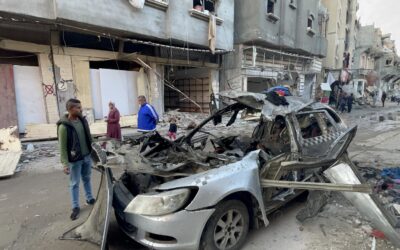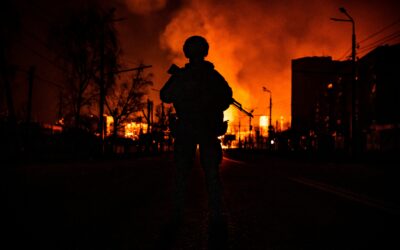
In Future Wars, Drone Weapons With Minds of Their Own
SUBSCRIBER+EXCLUSIVE BRIEFING — Drone weapons are part of the daily narrative of the war in Ukraine – from Russia’s use of Iranian drones against infrastructure […] More
Even by the standards of the Trump Administration’s generally rocky start, the State Department has fared badly in media reporting and insider commentary. Council on Foreign Relations President Richard Haass, on CNN’s Fareed Zakaria GPS program March 19, summed up the alleged litany of problems, from the huge budget cuts to absent senior officials to bad blood with journalists and even with many in the bureaucracy. That echoes almost daily criticism over the past several weeks from sources as disparate as David Ignatius in the Washington Post March 11 (“When Will Tillerson Find His Voice”) and Politico March 20th (“Tillerson Blunders Around Asia”).
What’s going on? Citizens who follow foreign affairs, other Trump Administration agency leaders, and not least, foreign officials, might ask. The answer is, everyone should take a deep breath. As this author wrote in December, Secretary of State Rex Tillerson’s “job one” will be winning the trust of the President, a task complicated by the latter’s unique view of both foreign affairs and communications.
If anything, that analysis was too optimistic. The Trump Administration foreign policy is characterized by—to paraphrase former Defense Secretary Don Rumsfeld—the unknowns we know and those we don’t. The former flows from a nationalist foreign policy advocated by the President and described by Walter Russell Mead in Foreign Affairs as “Jacksonian,” as compared to the internationalist global orientations of presidents since FDR. They pursued variants of what Mead calls “Hamiltonian” or “Wilsonian” policies, committed to America playing a key global leadership role. The former oriented on power and trade, the latter on values and international law.
Given the extraordinary ‘sunk costs’ the U.S. has invested in the international system it runs and the benefits to us, from security to free flow of ideas and goods (even if not acknowledged by many Americans, according to PEW surveys and other reporting), Trump’s incipient efforts to change course in an unknown direction produce chaos.
But the uncharted unknowns pose greater problems. The first, seemingly advocated by Trump strategist Steve Bannon and others close to him, seeks the instrumentalization of disruption and disorganization, and the resulting chaos, for a revolutionary remaking of America agenda. While the President’s commitment to “Plan Bannon” is not clear, Trump generates the second uncharted unknown: off-the-cuff communications and policy initiatives that defy logic and appear counterproductive, even to a rational exposition of his “Jacksonian” agenda. These include the ‘wall’ imbroglio with Mexico, the first travel limitation executive order, and the whole Russia-Obama-wiretapping morass.
Under such circumstances, Tillerson’s mission to win White House confidence is extraordinarily difficult. But he certainly is having an impact, as a Washington Post article March 19 noted in describing the fight within the administration to define an “America First” foreign policy. Tillerson is in the realist camp, what Mead would probably call a “Hamiltonian” internationalist. Trump team members from the military and Wall Street generally share that view, and coordination between Tillerson and these allies, by various insider accounts, is extensive. Given the pressures for one or another variant of a Jacksonian, isolationist, or even revolutionary foreign policy, the fact that Trump foreign policy execution so far has largely adhered to traditional post-World War II principles—whether one believes those are right or not—speaks to the success of Tillerson and other like-minded cabinet level officials.
That said, there are several areas where Department leadership needs to devote more attention: personnel, organization, budget, and system integrity. Personnel and organization are intimately connected. Tillerson has helped here by selecting an experienced, well-regarded senior statesman and top lawyer, John Sullivan, as Deputy Secretary. But there remains around the secretary a dearth of people who know the system and diplomatic tradecraft; beyond the usual whining with any new leadership, there are signs even among those well disposed towards Tillerson that more discipline and coordination are necessary to maximize his undeniable negotiating skills and global experience.
Budget remains a serious problem, although here as well, Tillerson deserves credit for restoring 25 percent of the budget initially cut. But with the remaining almost 30 percent cut, the Department will not have the financial air to breathe. Almost half the budget last year went to foreign assistance, about half of that half either to direct American security (for allies to buy American weapons, so they, not we, fight; infectious disease money that keeps epidemics from our shores) or to indirect security (refugee funds that will help stem further destabilization of our NATO allies). Of the remainder, a large portion went to food assistance and disaster relief, compelling humanitarian causes with strong bang for the buck. That left at most a third for traditional development and economic support funds, the most obvious candidate for savings.
Could other countries compensate for such serious cuts in U.S. assistance? Not easily. Aside from the political problems governments would have convincing their publics to ‘fix’ wildly unpopular American retrenchment, budgeting money and then deploying delivery mechanisms to replace American programs would take years.
On the operations side, most of State’s money goes to operate and secure 250 diplomatic establishments—platforms for the entire U.S. government, including major military elements. Closing some will generate minimum savings at maximum diplomatic cost. Likewise, State’s consular operations earn considerable visa fees and facilitate hundreds of billions of dollars in tuition fees, investment, and trade. State is awash with special envoys for pet rock projects. They can be eliminated, but that will save next to nothing.
The actual corps of State officers who do diplomatic work—reporting, representing, negotiating, managing bilateral relations and functional programs like counter-terrorism and human rights—is at most 25 percent of State’s 24,000 U.S. employees; one of that group’s key jobs is to ride herd on the otherwise uncoordinated ‘private’ foreign policies of defense, intelligence, and economic agencies whose numbers doing policy related work for their own departments and agencies dwarf those of the State officers trying to manage coherent, government-wide coordinated foreign policy.
In the business world, a 10 percent cut in organization funds often yields less than a 10 percent loss in efficiency, as business has autonomous decision powers and a quantitative measure—profit and loss. State has no such powers or measures. What ‘works’ and what doesn’t is hard to quantify. Moreover, programs and personnel are subject to congressional whims, pressure groups, laws, unions, and regulations. Try defining, let alone firing, the 10 percent, lowest performing staffers.
Finally, State leadership should focus more on system integrity within the Department. This is more critical than personnel morale, a highly subjective measure that cannot easily distinguish between relatively normal griping at the new and different, and true crises among employees. System integrity is the way competent professionals in teams deal with each other within the organization in times of stress. It involves ‘mission before me,’ trust in leadership, clear lines of authority, and confidence in oneself and one’s colleagues. It’s a key element for evaluation in grueling military exercises. But at the moment, there are worrying signs it is fraying in the State Department, given failure to fill leadership slots, the dramatic budget cuts, new and largely unknown direction of foreign policy, and the outbursts of the President and some on his team.
Now, State can muddle along doing routine operations with weak system integrity. But come a crisis, something like the ‘surge’ of Department personnel to Iraq, Afghanistan, and Pakistan 2004-2010, or a tragedy like Benghazi or Tehran, operating the department under such non-routine, emergency conditions will depend on system integrity. This cannot be developed on the fly, nor replaced by a few committed leaders working 20 hour days. It will either be there or won’t. The President and American people need State to perform magnificently in such crises. No one can be sure it can do so right now.
(Editors Note: Over the past four years, the author was an advisor to ExxonMobil where Tillerson previously served as the CEO.)
Related Articles

SUBSCRIBER+EXCLUSIVE BRIEFING — Drone weapons are part of the daily narrative of the war in Ukraine – from Russia’s use of Iranian drones against infrastructure […] More

SUBSCRIBER+ EXCLUSIVE ANALYSIS — Iran’s retaliatory strikes against Israel this weekend were both a potentially game-changing, historic first — and an underwhelming response. Historic, because […] More

SUBSCRIBER+EXCLUSIVE INTERVIEW — Ukraine was hit by a fresh round of Russian missile attacks on Thursday, strikes that targeted and damaged the country’s power grid […] More

SUBSCRIBER+ EXCLUSIVE REPORTING — The Israeli drone strike that killed three adult sons (who Israel says were Hamas operatives) and four grandchildren of Hamas’s Qatar-based […] More

BOTTOM LINE UP FRONT – In the spring of 2022, Ukraine beat back a Russian assault on the nation’s capital and punished the invaders on […] More

SUBSCRIBER+EXCLUSIVE — The Ukraine war has reached a “pivotal moment,” a “critical stage,” an “inflection point“ – all phrases used to describe the current situation […] More
Search